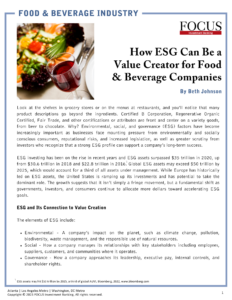
How ESG Creates Value for Food and Beverage Companies
ESG—environmental, social, and governance factors—continues to capture headlines for a variety of reasons, perhaps most notably for its rapid rise. ESG assets surpassed $35 trillion in 2020, up from $30.6 trillion in 2018 and $22.8 trillion in 2016, and by 2025 global ESG assets may exceed $50 trillion. What may have initially been viewed as a fringe movement, ESG is now part of the mainstream and greatly driven by mounting environmental, social, and governance concerns among consumers, investors, and governments.
Taking a proactive approach with ESG is critical for the long-term health of a business, especially businesses operating in the food and beverage industry. As an industry that accounts for 70% of global freshwater withdrawal and a third of all global greenhouse gas emissions, in addition to the issues surrounding worker health and safety, food and beverage companies face growing scrutiny to improve their environmental and social practices.2
For many in the F&B industry, ESG initiatives historically have remained on the periphery in part because of the view that ESG comes at a cost. Ask a food and beverage CEO about reducing packaging, investing energy efficiency measures, or expanding employee benefits, and many will view the changes as nice to have, but perhaps not a priority. However, businesses that integrate ESG factors into their business strategy can boost their value proposition and enjoy several benefits including gaining new customers, attracting and retaining talent, and/or enhancing their position during the M&A process. In this article, we provide an overview of ESG in the context of the food and beverage industry and how it links to value creation.














